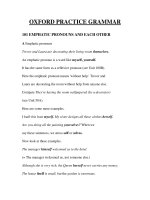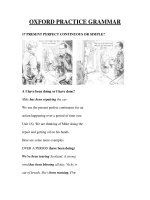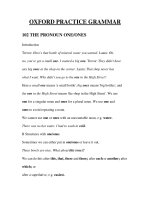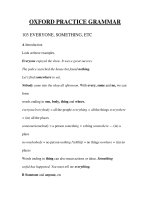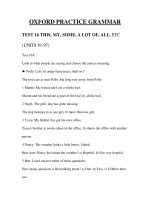OXFORD PRACTICE GRAMMAR 103
Bạn đang xem bản rút gọn của tài liệu. Xem và tải ngay bản đầy đủ của tài liệu tại đây (88.94 KB, 6 trang )
OXFORD PRACTICE GRAMMAR
103 EVERYONE, SOMETHING, ETC
A Introduction
Look at these examples.
Everyone enjoyed the show. It was a great success.
The police searched the house but found nothing.
Let's find somewhere to eat.
Nobody came into the shop all afternoon. With every, some and no, we can
form
words ending in one, body, thing and where.
everyone!everybody = all the people everything = all the things everywhere
= (in) all the places
someone/somebody = a person something = a thing somewhere — (in) a
place
no one/nobody = no person nothing /'nA0irj/ = no things nowhere = (in) no
places
Words ending in thing can also mean actions or ideas. Something
awful has happened. You must tell me everything.
B Someone and anyone, etc
We can also form words with any: anyone, anybody, anything, anywhere.
For some and any see Unit 94A.
Positive: There's someone in the phone box.
Negative: I looked round the shops, but I didn't buy anything.
Question: Has anyone seen today's newspaper?
Offer/Request: Could you do something for me, please?
We can also use words with any in a positive sentence.
This door is always left open. Anyone could just walk in here.
Where shall we go? ~ Anywhere. I don't mind.
In these sentences anyone means 'it doesn't matter who', and anywhere
means
'it doesn't matter where'. For more details about any see Unit 94C.
C Singular and plural
We use a singular verb after everyone, something, anything, etc.
Everywhere was very crowded. No one knows how to start the motor. After
words with one or
body, we normally use they/them/their, even though the verb is singular.
Everyone is having their lunch. Nobody wants to have their coffee yet. We
can also use he, she,
him, her, his, etc with someone/somebody when we know the person's sex.
Someone left their/her handbag behind.
D Other structures
After everyone, something, etc we can use an adjective.
Let's go somewhere nice. Is there anything interesting in that magazine?
We can also use else.
We always play Scrabble. Let's play something else. {= a different game)
Henry wore a suit, but everyone else had jeans on. (= all the other people)
Words ending in one and body have a possessive form (with 's).
Someone's cat is on our roof. I need to be informed about everybody's
plans.
page 380 Someplace, etc in American English
103 EXERCISES
Everyone, something, etc (A)
Complete the conversations. Put in the correct words. ► Melanie: Did you
say you found
something in the street? David: Yes, a diamond ring.
1 Nick: We all know the man is a thief, don't we?
Tom: Yes,…………………………. knows, but………………………. dares
to say so publicly.
2 Mark: Were there any calls for me?
Secretary: Yes, …………………………..rang while you were out. It was
rather strange. He refused to give
his name, but he wants to discuss ................………….. with you.
3 Melanie: Do you have any plans for the summer?
Tom: I'd like to go away……………………… if I
can……………………….. I know has invited
me to his villa in Portugal, so I may go there.
4 Daniel: Has Matthew got a job yet?
Emma: No, but he's looked ………………………….. He's been to all the
job agencies. He hates the
idea of sitting around doing ................................……………….
2 Someone and anyone, etc (B)
Put in someone, anyone, something, anything, somewhere or anywhere.
Rachel: Have you seen my calculator? I can't find it (►) anywhere.
Vicky: No, I haven't. Perhaps (1)................................. 's borrowed it.
Rachel: I haven't given (2) ............................... permission to borrow it.
It must be (3)……………………in this room.
Vicky: Things are in such a mess. It could be (4) .....................................
Rachel: I know. I can never find (5) ................…………….. when I want it.
Vicky: We'll have to do (6)………………………… about this mess. We'd
better tidy it up.
3 Singular and plural (C)
Choose the correct form.
► We had to wait because someone had lost its/their ticket.
1 One of the policemen had injured his/their arm.
2 One of the guests had brought something wrapped in brown paper. She put
it/them on the table.
3 No one likes/like going to the dentist, do he/they?
4 Everyone have/has to leave his/their bags outside.
4 Other structures (D)
Rewrite the sentences using a phrase with everyone, someone, something,
nothing and
somewhere instead of the phrases in brackets.
? I'd like to buy (a nice thing). I'd like to buy something nice.
? Let's go (to another place), shall we? Let's go somewhere else, shall we ?
► I'll try to remember (the name of everyone). I'll try to remember
everyone's name.
1 1 once met (a famous person)
............................................................................

